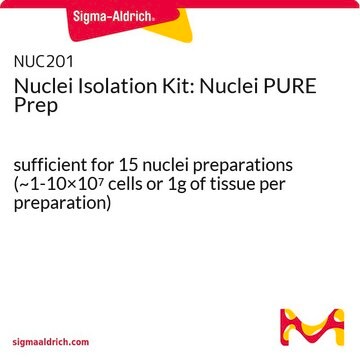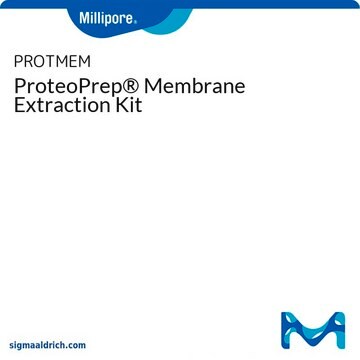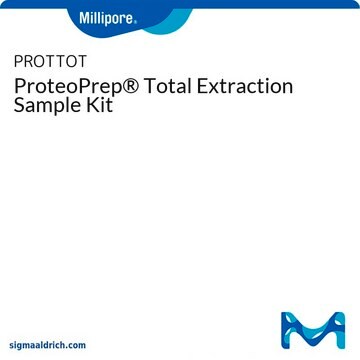2900
Nuclear Extraction Kit
Sinónimos:
Nuclear Isolation Kit
Iniciar sesiónpara Ver la Fijación de precios por contrato y de la organización
About This Item
UNSPSC Code:
41116012
eCl@ss:
32160405
Productos recomendados
manufacturer/tradename
Chemicon®
technique(s)
protein extraction: suitable
application(s)
sample preparation
shipped in
dry ice
Application
CHEMICON′s Nuclear Extraction Kit (Catalog No. 2900) provides a simple and convenient method for the isolation of cytoplasmic and nuclear samples from mammalian cell culture or tissue samples. The Nuclear Extraction Kit can be used in the preparation of purified proteins for use in Western blotting, Electrophoretic Mobility Shift Assays (EMSA), and in CHEMICON′s Transcription Factor Assay product line.
For Research Use Only; Not for use in diagnostic procedures.
For Research Use Only; Not for use in diagnostic procedures.
Research Category
All
All
Components
Cytoplasmic Lysis Buffer, 10x: - (Part No. 90497) One vial containing 10mL of a concentrated lysis buffer. Dilute to a 1x in deionized water.
Nuclear Extraction Buffer: - (Part No. 90498) One vial containing 50mL of a 1x nuclear extraction buffer.
PBS Packets: - (Part No. 60093) Two pouches containing enough dry reagent to prepare 1 liter of a 1x PBS solution per pouch. Dilute packet in deionized water.
DTT, 1M: - (Part No. 90499) One vial containing 100 μL of 1M Dithiothreitol. Prior to use, dilute to a final concentration of 0.5mM (1:2000) in 1x Cytoplasmic Lysis Buffer and 1x Nuclear Extraction Buffer.
Protease Inhibitor Cocktail: - (Part No. 90492) One vial containing 100μL of protease inhibitors in DMSO for use with mammalian cell and tissue extract buffers. A mixture of protease inhibitors with broad specificity for the inhibition of serine, cysteine and aspartic acid proteases and aminopeptidases. Contains 4-(2-aminoethyl)benzenesulfonyl fluoride (AEBSF), pepstatin A, E-64, bestatin, leupeptin, and aprotinin. Contains no metal chelators (e.g. EDTA, EGTA). Prior to use, dilute 1/1000 in 1x Cytoplasmic Lysis Buffer and 1x Nuclear Extraction Buffer.
Detergent, 10%: - (Part No. 90500) One vial containing 3mL of 10% IGEPAL CA-630 (detergent). Cytoplasmic Lysis Buffer and Nuclear Extraction Buffer already contain detergent, however, under certain conditions, more detergent may be required - refer to Extraction Procedure.
Nuclear Extraction Buffer: - (Part No. 90498) One vial containing 50mL of a 1x nuclear extraction buffer.
PBS Packets: - (Part No. 60093) Two pouches containing enough dry reagent to prepare 1 liter of a 1x PBS solution per pouch. Dilute packet in deionized water.
DTT, 1M: - (Part No. 90499) One vial containing 100 μL of 1M Dithiothreitol. Prior to use, dilute to a final concentration of 0.5mM (1:2000) in 1x Cytoplasmic Lysis Buffer and 1x Nuclear Extraction Buffer.
Protease Inhibitor Cocktail: - (Part No. 90492) One vial containing 100μL of protease inhibitors in DMSO for use with mammalian cell and tissue extract buffers. A mixture of protease inhibitors with broad specificity for the inhibition of serine, cysteine and aspartic acid proteases and aminopeptidases. Contains 4-(2-aminoethyl)benzenesulfonyl fluoride (AEBSF), pepstatin A, E-64, bestatin, leupeptin, and aprotinin. Contains no metal chelators (e.g. EDTA, EGTA). Prior to use, dilute 1/1000 in 1x Cytoplasmic Lysis Buffer and 1x Nuclear Extraction Buffer.
Detergent, 10%: - (Part No. 90500) One vial containing 3mL of 10% IGEPAL CA-630 (detergent). Cytoplasmic Lysis Buffer and Nuclear Extraction Buffer already contain detergent, however, under certain conditions, more detergent may be required - refer to Extraction Procedure.
Storage and Stability
The Nuclear Extraction Kit is shipped and stored at -20ºC.
·Cytoplasmic Lysis Buffer (10x), Nuclear Extraction Buffer (1x), 10% Detergent, and the PBS Packets can be stored at 2-8ºC.
·DTT, 1M and Protease Inhibitor Cocktail must be stored at -20ºC. Avoid repeated freeze-thaw cycles.
·Cytoplasmic Lysis Buffer (10x), Nuclear Extraction Buffer (1x), 10% Detergent, and the PBS Packets can be stored at 2-8ºC.
·DTT, 1M and Protease Inhibitor Cocktail must be stored at -20ºC. Avoid repeated freeze-thaw cycles.
Legal Information
CHEMICON is a registered trademark of Merck KGaA, Darmstadt, Germany
Disclaimer
Unless otherwise stated in our catalog or other company documentation accompanying the product(s), our products are intended for research use only and are not to be used for any other purpose, which includes but is not limited to, unauthorized commercial uses, in vitro diagnostic uses, ex vivo or in vivo therapeutic uses or any type of consumption or application to humans or animals.
signalword
Danger
hcodes
Hazard Classifications
Aquatic Chronic 3 - Eye Dam. 1 - Skin Irrit. 2
Storage Class
10-13 - German Storage Class 10 to 13
wgk_germany
WGK 3
Certificados de análisis (COA)
Busque Certificados de análisis (COA) introduciendo el número de lote del producto. Los números de lote se encuentran en la etiqueta del producto después de las palabras «Lot» o «Batch»
¿Ya tiene este producto?
Encuentre la documentación para los productos que ha comprado recientemente en la Biblioteca de documentos.
Los clientes también vieron
Hong Ma et al.
PloS one, 8(8), e71302-e71302 (2013-08-27)
Diminished Ikaros function has been implicated in the pathogenesis of acute lymphoblastic leukemia (ALL), the most common form of childhood cancer. Therefore, a stringent regulation of Ikaros is of paramount importance for normal lymphocyte ontogeny. Here we provide genetic and
Alessandra Pecorelli et al.
Redox biology, 28, 101334-101334 (2019-10-14)
Rett syndrome (RTT) is a progressive neurodevelopmental disorder mainly caused by mutations in the X-linked MECP2 gene. RTT patients show multisystem disturbances associated with an oxinflammatory status. Inflammasomes are multi-protein complexes, responsible for host immune responses against pathogen infections and
Suchismita Panda et al.
PLoS biology, 16(10), e2004204-e2004204 (2018-10-09)
Long noncoding RNAs constitute a major fraction of the eukaryotic transcriptome, and together with proteins, they intricately fine-tune various growth regulatory signals to control cellular homeostasis. Here, we describe the functional characterisation of a novel pair of long intergenic noncoding
Shweta P Jadhav et al.
Journal of neurochemistry, 130(3), 388-401 (2014-04-23)
Chronic activation of microglia, the macrophages of the CNS, has been shown to enhance neuronal damage because of excessive release of proinflammatory cytokines and neurotoxic molecules in a number of neurodegenerative diseases. Recent reports showed altered microRNA (miRNA) expression in
Chenguang Gong et al.
Developmental cell, 34(2), 181-191 (2015-07-07)
Increasing evidence suggests that long non-coding RNAs (LncRNAs) represent a new class of regulators of stem cells. However, the roles of LncRNAs in stem cell maintenance and myogenesis remain largely unexamined. For this study, hundreds of intergenic LncRNAs were identified
Nuestro equipo de científicos tiene experiencia en todas las áreas de investigación: Ciencias de la vida, Ciencia de los materiales, Síntesis química, Cromatografía, Analítica y muchas otras.
Póngase en contacto con el Servicio técnico
















